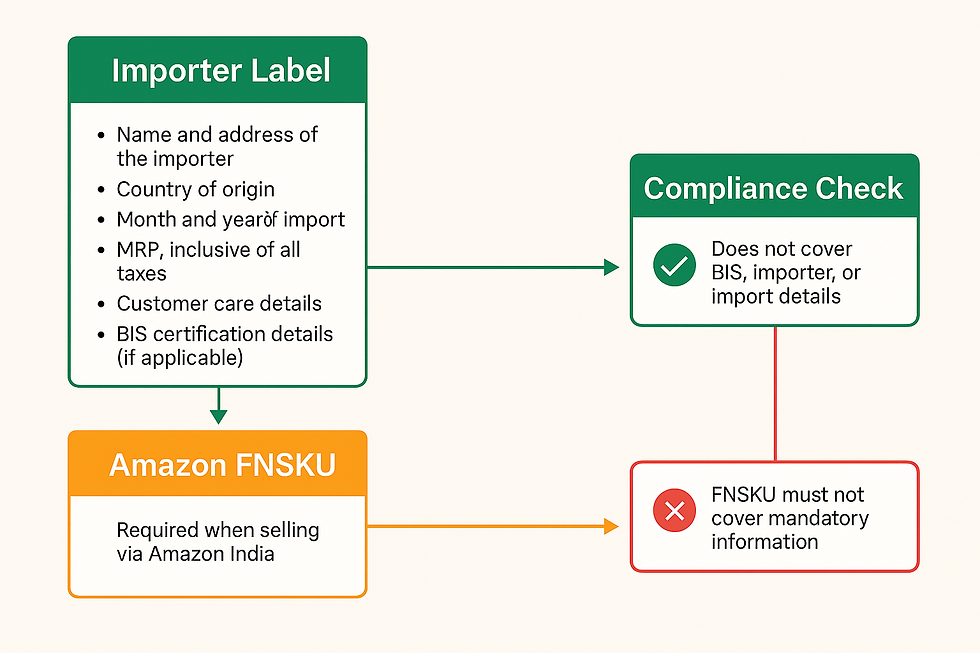Understanding BIS, Legal Metrology, and Labeling Requirements for Imported Products in India
- Ajay Miglani

- Sep 25, 2025
- 2 min read
When importing and selling products in India, businesses must navigate a detailed regulatory framework to remain compliant. Two key elements in this framework are BIS (Bureau of Indian Standards) certification and the Legal Metrology (Packaged Commodities) Rules, 2011. Together, these ensure consumer protection, accurate product information, and accountability from importers.
What is BIS and Legal Metrology?
BIS (Bureau of Indian Standards):The BIS is India’s national standards body. For certain categories of products (electronics, appliances, food-contact materials, etc.), BIS certification is mandatory. The BIS mark assures consumers that the product meets Indian safety and quality standards.
Legal Metrology (Packaged Commodities) Rules, 2011:Legal Metrology deals with weights, measures, and packaging to protect consumers from unfair trade practices. Under the Packaged Commodities Rules, any imported packaged product sold in India must display specific mandatory declarations.
Mandatory Declarations on Imported Products
For any packaged product imported into India and offered for retail sale, the following information must appear on the Importer’s Label:
Name and address of the importer
Country of origin
Month and year of import
Maximum Retail Price (MRP), inclusive of all taxes
Customer care details (name, address, telephone/email)
BIS certification details (if the product falls under mandatory BIS standards)
These details must be clearly visible, legible, and not obscured in any way.
Selling on Amazon India: The FNSKU Requirement
When products are sold via Amazon India FBA (Fulfilment by Amazon), there is an additional layer to labeling:
FNSKU (Fulfilment Network Stock Keeping Unit):Amazon requires that each product stored in its fulfillment centers carry a unique FNSKU label. This ensures that Amazon can track your specific inventory, even if identical products are sold by multiple sellers.
Why not use the regular UPC/EAN barcode?While global barcodes like UPC or EAN identify the product universally, Amazon India’s FBA system recognizes only its own FNSKU. Therefore, the FNSKU must be applied directly on the product packaging.

The Compliance Challenge: FNSKU vs. Importer’s Label
A common mistake is to place the FNSKU label over parts of the Importer’s Label. This is risky because:
If the BIS number, month/year of import, or importer details are covered, it may be viewed as concealment of mandatory information.
The Legal Metrology Department can impose penalties for such violations.
Amazon India may also flag your listings if packaging does not comply with LMPC rules.
Best Practices for Compliance
To stay safe and compliant:
Plan Label Placement Carefully – Ensure that the FNSKU is applied without covering mandatory details on the Importer’s Label.
Design Importer Labels with Space for FNSKU – Leave blank areas where the FNSKU can be placed without overlap.
Consider Combined Labels – Some importers print a combined label that incorporates both LMPC-compliant declarations and a reserved space for the FNSKU barcode.
Double-Check Before Shipment – Inspect sample packaging to confirm that all required details remain visible.
Final Word
Compliance with Indian Legal Metrology and BIS requirements is non-negotiable. When selling through Amazon India FBA, businesses must also align with Amazon’s FNSKU system. The key is ensuring that while meeting Amazon’s logistics requirements, you do not compromise on mandatory legal declarations. By planning ahead and placing labels strategically, you can avoid regulatory issues, protect your brand, and deliver a seamless experience to customers.




